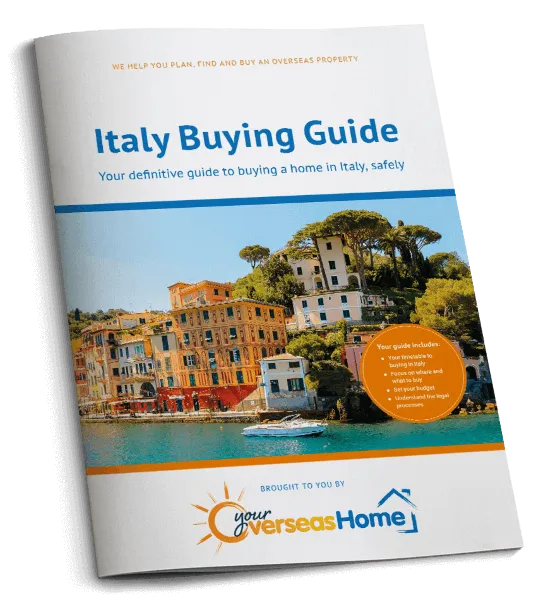When asked about living in Italy, I tend to answer based on my own experience. As a Brit abroad, questions about weather, taxes, food costs, healthcare, heating, safety and whether Italians speak English, often pop up. To help you on your journey to becoming an Italian homeowner, I’ve written down some FAQs and answered them as best as I can.
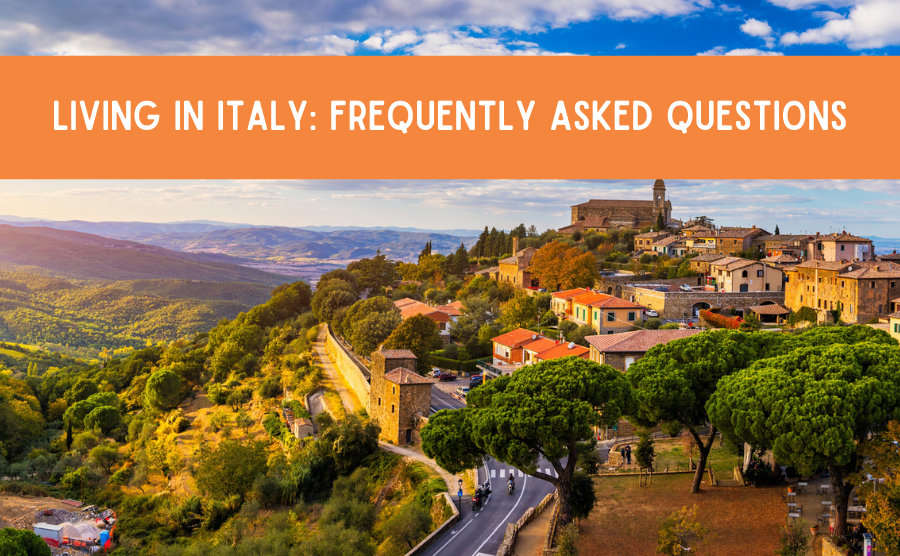
Our resident writer in Italy, Julia shares her advice on living in Italy
For more guidance on buying property in Italy, speak to Your Overseas Home today
When buying property overseas, it’s wise to be careful who you ask for information. Be wary of overly friendly people, who hope to earn money from you. It can seem daunting in the early stages and you will wonder who you can trust. But, once you discover the real Italy, its culture and friendly people you won’t look back.
I have lived in Puglia for 16 years, and remain just as enthusiastic about life in Italy as I was when I first arrived. I love learning more about this amazing country and sharing what I find. “I’m not a robot”, therefore I can fully appreciate the scent of jasmine wafting through the air, the intense flavour in a sun-ripened tomato, the beauty of the landscape, and the feel of the sun on my face with a fresh sea breeze.
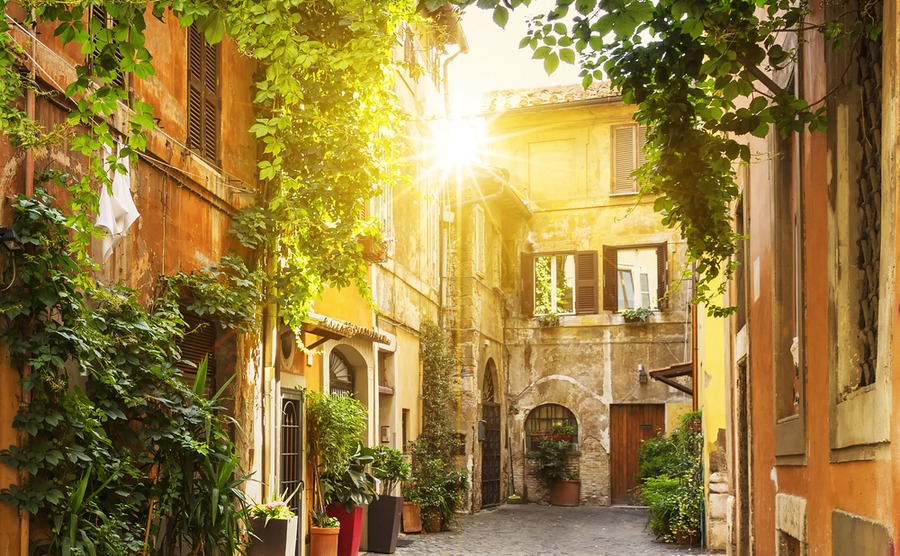
Trastevere
Find homes in Italy via our property portal.
1. What’s the weather like in Italy?
There can be a big difference between the weather in the mountains and the north, compared to the coastal plains and southern regions. In winter, you can expect snow in the Alps and rain in the northern regions, such as Liguria. Yet in cities like Milan, Florence and Rome you can also get temperatures over 30°C in summer. You can enjoy everything the seasons offer, from the sparkling sun on Lake Como to golden autumn leaves and walking in crisp white snow.
Winter in southern Italy comes in February and March. The average daytime temperature is 15°C, but it can feel like all the seasons in one week. One minute it’s 18°C, the next heavy rain, followed by blue skies. It does rain a lot less than in the northern regions, but it can still get cold on winter nights. Spring brings the cherry and almond blossom followed by a sea of wild flowers.
Be warned though, July and August in the far south can get very hot, over 35°C, and sometimes as high as 42°C. If you want to explore, spring and autumn are the best times to do so as the heat is warm but not too hot. Once you have found a region you are interested in, I suggest regularly watching its weather forecasts on meteo.it.

You could find retiring to Italy gives you significant tax advantages.
2. Are taxes high in Italy?
How much tax you pay varies greatly. A retired couple living year-round in a countryside villa in a southern municipality of less than 20,000 people, will pay very little tax. The various taxes relating to the property alone could total less than €250 a year. You may also be able to apply for the 7% tax rate on your pension income.
How much tax you pay on purchasing a property depends on whether you intend to become a resident in Italy or are just buying a holiday home. In both instances, there is a fixed mortgage tax of €50 and a fixed cadastral tax of €50 when you make the purchase. For more guidance on taxes, we recommend you speak to an independent financial advisor. We recommend Chase Buchanan.
Click here to discover all the taxes you’ll have to pay when living in Italy
3. Is food expensive in Italy?
In our 2024 Cost of Living Overseas Index, Italy came 4th for the most affordable supermarket shop. Overall, the cost of living in Italy was 27% cheaper than in the UK. Food grown in Italy generally costs less and is fresher.
As a resident in Italy myself, find that despite food prices going up in recent years, it is still possible to buy food at good prices. By buying fresh local produce from the weekly market, eggs from a local farm and other essentials from a cheap Italian supermarket chain (Eurospin), we keep our shopping bills to a minimum. I certainly notice the price differences when I visit supermarkets in the UK.
4. What’s healthcare like in Italy?
As a resident in Italy, I am registered with a family doctor and the Italian National Health Service, which is called the Servizio Sanitario Nazionale (S.S.N.). My Personal Healthcare Card (Tessera Sanitaria Personale) entitles me to the same healthcare and treatment as Italian citizens. My own experiences of the Italian Health Service may vary from those in other parts of the country, but it will give you some idea of how it works.
Read more about healthcare in Italy
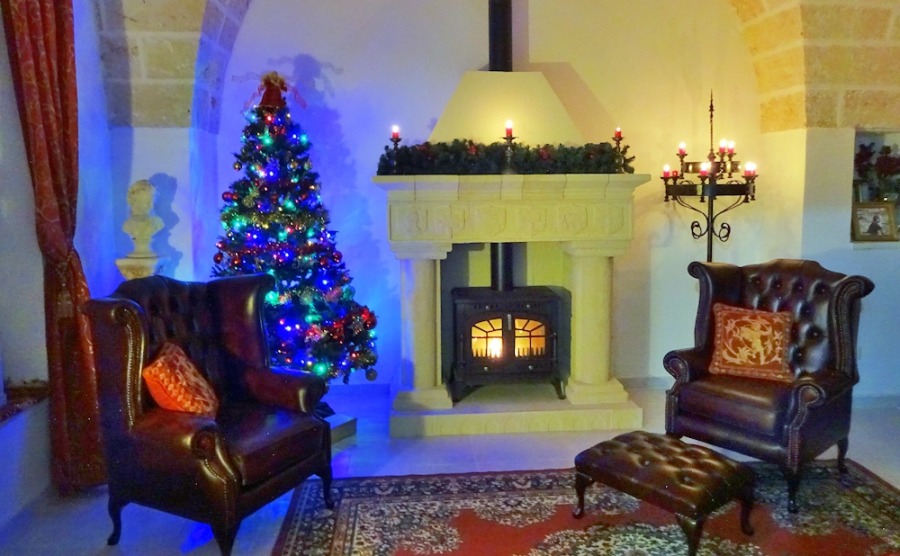
Our fireplace and stove that my husband put in.
5. Do you need heating in winter?
In every region of Italy, you will want some heating at some point during the winter. Many houses in the south are designed to keep cool in summer but can get rather chilly in winter. A small countryside villa with open doors to the living room might be able to get away with a woodburning stove, to take the chill off in the evening. We tend to put the radiator on in our bedroom, maybe 10 times over the winter, and have a quilt. We also have a wood-burning stove in the living room that we enjoy lighting on cold winter evenings.
Gas central heating
Houses in the northern regions are more likely to have gas central heating. Unfortunately, this now works out expensive. The government has also set rules for each region on when they can put on their gas heating, in an attempt to restrict gas usage, due to the Ukraine war. The way the country has been put in zones does give us a rough idea of how much heating you might need in each area. Although in Puglia, we don’t use nearly as much as we are allowed.
When to turn on the heating
Each area is allocated a climate zone, and each zone is told when they can turn on their heating and for how many hours. For example, in Zone A, the heating can only be turned on from 8th December for 5 hours a day. Whereas, in Zone F, which includes the coldest municipalities such as Trento, the heating can be turned on without limitations.
Milan, Turin and Bologna are in Zone E, where they can put the gas heating on from 22nd October-7th April; Rome, Florence and Pescara are in Zone D, 8th November to 7th April; Naples, Cagliari, and Bari in Zone C, 22nd November to 23rd March; Palermo, Reggio Calabria and Catania in Zone B, 8th December to 7th March.
Many properties have changed to electric with photovoltaic solar panels, helped by government incentives. Other houses have switched to wood or pellet fires that heat water for radiators. Wood is economical if like us you have plenty of wood from pruning trees.
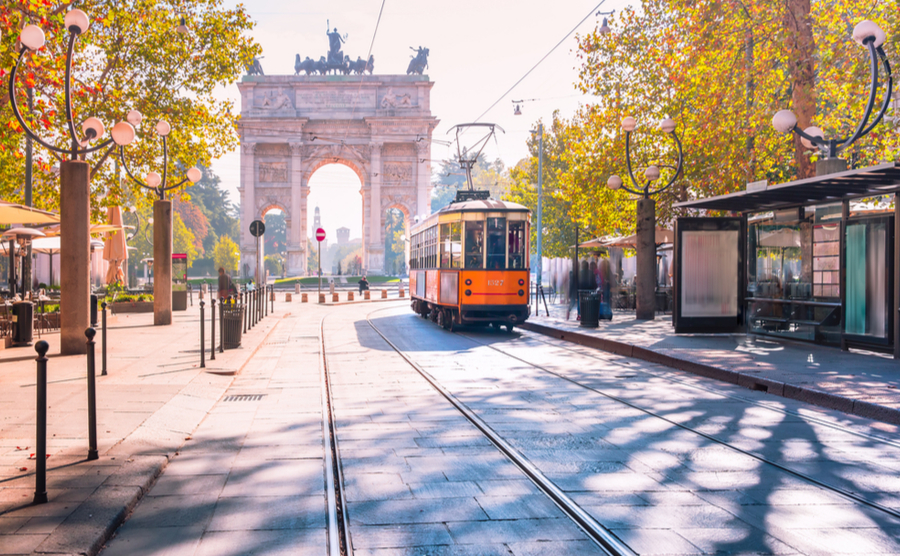
Famous vintage tram in the centre of the Old Town of Milan in the sunny day, Lombardia, Italy.
6. Is Italy a safe place to live?
In 2023, The Global Peace Index positioned Italy as in a high state of peace, coming 34th, considered more peaceful than the UK in 37th place. According to a report on Nationmaster, there are three times more crimes in the UK than in Italy. The murder rate is 36% lower in Italy and the fear of walking alone at night is 6% lower.
Finding a safe area
Most crimes in Italy are often regarding holiday homes left empty, which are targeted by burglars. As in all big cities, pickpocketing is rife, and people continue to be ripped off by dodgy builders and tradespeople – my advice here is to only use services which come highly recommended. When you move to a different country it is difficult to immediately spot the areas it is best to avoid. You will get a feel for a place when you visit and you should trust your feelings. In addition, I’ve found that a simple news search on the town you are interested in can come up with some interesting information. If it’s mainly, “Who has lost these keys?”, you are onto a winner.
When I compare my own experience of spending an evening out in Puglia, compared to a town in England, I notice a big difference. If there’s ever an event on in town I am happy to walk through the streets alone. But back in the UK, I certainly wouldn’t have done that. On a warm evening in Puglia, people of all ages are out in the Piazzas and streets of Italy, from parents with pushchairs to elderly men sitting on benches.
In general, people don’t go out to drink, and I have never seen a drunk. Most people are taking a stroll and meeting friends. However, I have noticed in the past year that different age groups come out at different times and stand in different areas, and drinking is on the increase among the young. The only place I don’t feel safe in Italy is on the roads. Unfortunately, some drivers in Italy are very dangerous, so you need to stay very alert.
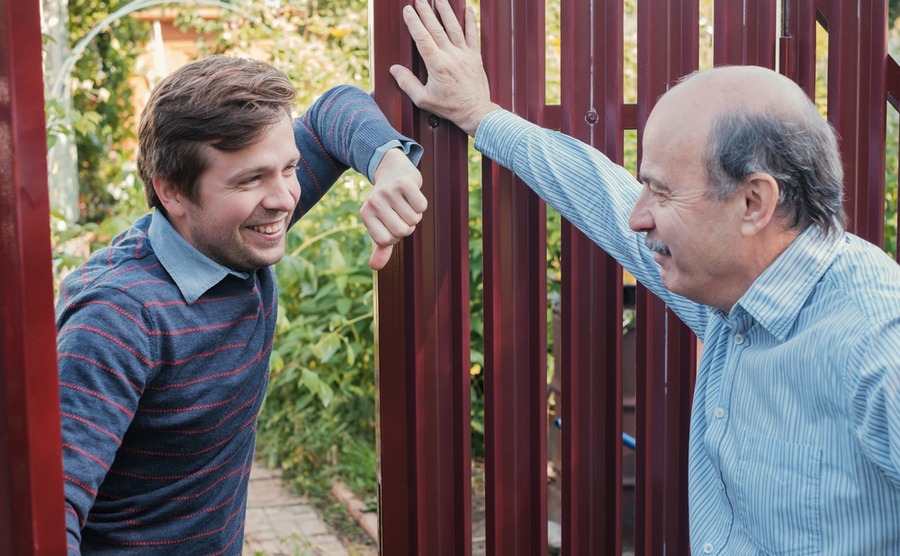
Everybody needs good neighbours, especially when you live in the country and have land
7. Do people speak English in Italy?
It is believed that about a third of Italians speak some English. Most of those will be found in the cities and tourist areas. We were confused when we first arrived in Puglia, as it was not only difficult to find someone who spoke English, but the older generations weren’t speaking Italian – they were speaking a local dialect.
When asking for directions, your chances of communication are better when speaking to a young person or café staff. All primary and middle school students in Italy have English lessons, from the age of six. In 2019, 99.6% of high school students in Italy learnt English. English is the most studied language in Italian schools. French is studied by 16.2% and Spanish by 14.8%. (Source: Statistica)
However, with so many schools needing English teachers, the quality of teaching varies. Although their grammar may be good, they might not have experience of speaking to an “English Mother Tongue”. Younger Italians are generally keen to practice their English with people for whom English is their first language. You may even find someone willing to exchange English conversation for Italian conversation. A win-win for you both, and you will gain a new Italian friend in the process. It certainly helps you to settle into Italian life, if you speak Italian and have Italian friends.
For more guidance on living in Italy, download our free buying guide
You might also like:











